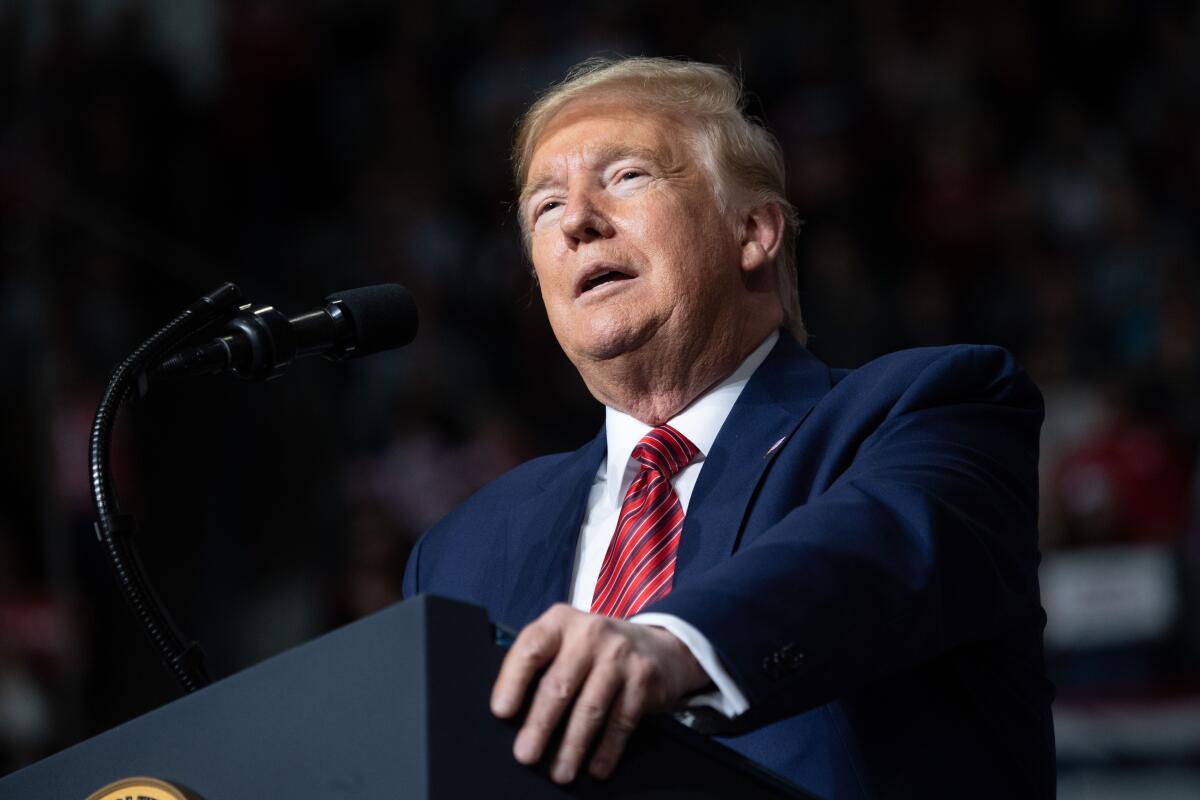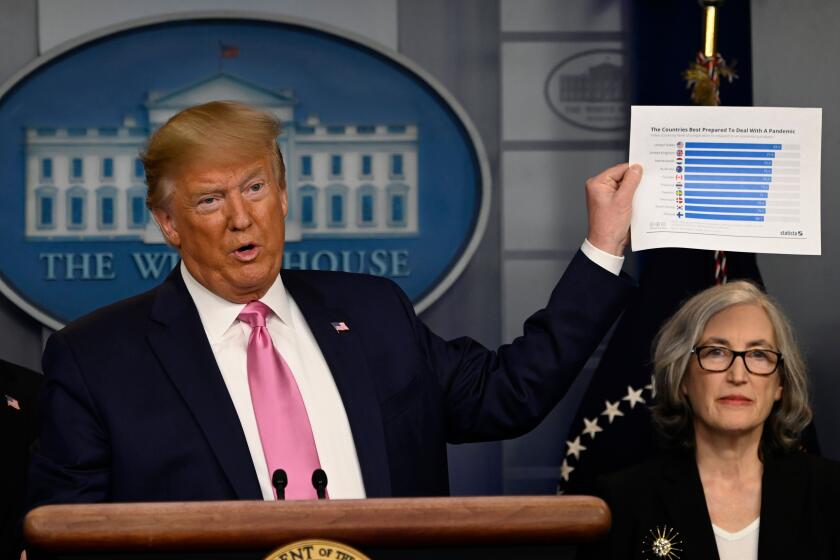Trump calls the crisis over coronavirus Democrats’ ‘new hoax’

NORTH CHARLESTON, S.C. — During a raucous rally here Friday on the eve of the state’s Democratic primary, President Trump brushed off the nation’s rising concerns about the coronavirus, declaring that “confidence is surging” in the economy, despite the stock market having just suffered its worst week of losses since 2008.
He accused Democrats of “politicizing” the growing public health crisis — but even as he outlined his administration’s response, including the creation this week of a new coronavirus task force led by Vice President Mike Pence, Trump suggested that the crisis over the outbreak is just the latest attempt by Democrats, frustrated that he’s withstood the special counsel probe and impeachment, to take him down.
“This is their new hoax,” Trump said.
Accusing the news media of being “in hysteria mode,” Trump boasted that his decision last month to quarantine people returning from China has kept the virus from spreading in the U.S. Trump said 15 cases had been reported in the nation so far, but Johns Hopkins University is reporting 62 such cases. That number is expected to rise.
“So far we have lost nobody to coronavirus in the United States,” he said. “We are totally prepared.”
The rally, which came on the eve of Saturday’s Democratic primary contest in South Carolina, was the latest effort by the president’s campaign to assert his own presence — and counter-narrative — in an early state nominating contest.
With the state Republican Party canceling its 2020 primary, largely out of deference to Trump, the president sought to flex his muscle, asking his supporters to vote in Saturday’s Democratic contest and polling the crowd on whether Vermont Sen. Bernie Sanders or former Vice President Joe Biden, the two leading candidates in the statewide polls, would be easier to run against.
“Bunch of losers,” Trump said, deriding former New York City Mayor Michael R. Bloomberg for what he said was “the worst debate performance in history,” and Biden for his verbal stumbles.
“Can you imagine if I made just a small fraction of the mistakes he makes?” Trump said.
Biden appears to be in line for his first major primary victory as a presidential candidate, with a Monmouth University poll Thursday showing him sitting high atop the field with 36% of the vote. Another recent poll by the Charleston Post and Courier, however, showed a closer race with Biden at 28%, just four points ahead of Sanders.
A Biden victory in South Carolina could serve as proof that the president’s months of broadsides over his son’s job in Ukraine did not deliver a fatal blow to the former vice president’s candidacy.
But any momentum from such a win could be short-lived as the race moves quickly to the March 3 Super Tuesday contests in 14 states that are likely to deliver a mixed result and could propel Bloomberg past Biden as the strongest alternative to Sanders, given the billionaire businessman’s overwhelming financial advantage.
During his final South Carolina campaign event Friday, Sanders told voters in Columbia that Trump’s decision to hold a rally in the state on the eve of the primary, especially considering rising concerns about the coronavirus outbreak, was “pathetic.”
“We might think that in the midst of a major healthcare crisis the president of the United States would be assembling doctors and scientists and researchers,” Sanders said. “Not Donald Trump. He is here in South Carolina. For one reason: to disrupt the Democratic Party.”
A coronavirus outbreak in the U.S. could become the most important issue of the 2020 presidential election, potentially affecting the economy, campaigning and voting.
Bloomberg, campaigning in Memphis on Friday, also blasted Trump’s response to the crisis, blaming him for the week’s massive sell-off on Wall Street, the market’s worst week since the 2008.
“The stock market has plunged partly out of fear, but also because investors have no confidence that the president is capable of managing the crisis,” Bloomberg said.
Although the coronavirus could upend the electoral calculus, Trump’s campaign has become increasingly confident as the first month of Democratic primary contests have done little to settle the field and is looking to press its financial advantage and head start on the eventual nominee, who could wind up bogged down in a delegate fight all the way to the July convention.
Trump’s campaign earlier this week previewed a plan to open 15 retail storefronts in predominantly black neighborhoods across several swing states, showing reporters renderings of “community centers” offering merchandise, voter registration forms and videos, posters and pamphlets highlighting the president’s work on criminal justice reform, the record low black unemployment rate and other issues of specific interest.
With the capacity crowd seated more than two hours before Trump arrived, volunteers handed out signs, including a new one marked “Black Voices for Trump” on one side, and “Text WOKE” on the back. Two campaign aides warmed up the crowd, criticizing Rep. James Clyburn (D-S.C.), who threw his support behind Biden this week, and declaring that “black voters are no longer naive” and that more would be supporting Trump.
“We expect to win a historic share of the black vote,” Trump declared, drawing a raucous ovation from the mostly white crowd.
But at one point as he touted criminal justice reform, Trump derided two African American political figures, CNN commentator Van Jones and the Rev. Al Sharpton, joking of the latter that he “looked better when he was heavier,” drawing laughter and cheers from the crowd.
Chryl N. Laird, a Bowdoin College professor and co-author of “Steadfast Democrats: How Social Forces Shape Black Political Behavior,” said the Trump campaign’s new outreach is unlikely to cause a dramatic shift among black voters, whose overwhelming loyalty to the Democratic Party is rooted in social networks and a shared history that stretches back to the civil rights movement.
“People read through the pandering because substantively it just doesn’t hold water,” said said. “The norm in the black community is so strong in terms of partisan affiliation. There is such a visceral reaction to people who associate themselves with Trump — if you make that choice, you’re going to be seen as a sellout in the black community and it’s going to stick.”
The outreach, she said, “feels superficial,” especially given Trump’s pattern of stoking racial division — his declaration after the violence in Charlottesville after a 2017 march by white supremacist groups that there were “good people on both sides,” his denigration of several African nations as “shithole countries” and his demeaning depiction of majority black cities like Baltimore, which he described as “rat infested.”
But if his direct overtures to black voters muddy the waters enough to keep some voters at home or ease lingering concerns suburban white voters may have about his character, they’ll have paid dividends enough.
“The appeals may not be for African Americas at all,” Laird said. “Maybe they’re for other people, just to see him doing it.”
Trump won the presidency in 2016 despite earning just 8% of the black vote. Even marginal improvements with black voters, specifically men, could help him secure a second term by tipping the scales in the swing states that will determine the electoral college.
Cornell Belcher, a Democratic pollster working for Mike Bloomberg’s presidential campaign, says Trump’s campaign is smart to compete for black voters, many of whom have made it clear in focus groups he’s conducted that they do not feel a strong connection to the Democratic party or its current field of potential nominees.
“We don’t so much have a messaging problem so much as we have a structural problem in how we engage voters who are more likely to be watching YouTube than cable TV.” Belcher said. “If Donald Trump gets to them first, it doesn’t take but one or two percentage points more and the race in each of these battleground states is different.”
More to Read
Get the L.A. Times Politics newsletter
Deeply reported insights into legislation, politics and policy from Sacramento, Washington and beyond. In your inbox three times per week.
You may occasionally receive promotional content from the Los Angeles Times.












